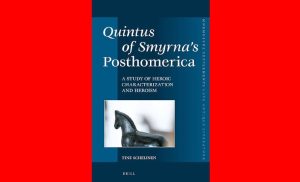Posthomerica | Quintus Smyrnaeus | A Review
Posthomerica by Quintus Smyrnaeus-A Review
Introduction:
‘Posthomerica’ by Quintus Smyrnaeus is an epic poem often referred to as the “Little Iliad” as it serves as a sequel to Homer’s ‘Iliad’. Composed in the 3rd century AD, this work is a lesser-known continuation of the Trojan War narrative, picking up where Homer’s ‘Iliad’ left off. While it does not hold the same level of acclaim as the ‘Iliad’ or the ‘Odyssey’, it offers an interesting perspective on the events following the fall of Troy.
Plot Summary:
The ‘Posthomerica’ begins with the death of Hector and the fall of Troy, which marked the conclusion of the ‘Iliad’. It then follows the Greek heroes on their journey back home after the war, focusing primarily on the stories of Neoptolemus (Pyrrhus), son of Achilles, and his exploits. The narrative also introduces several other characters who were not heavily featured in the ‘Iliad’ but played important roles in the aftermath of the war.
Themes:
Continuation of Epic Tradition: ‘Posthomerica’ continues the epic tradition established by Homer, keeping alive the grandeur of the heroic age and the Greek mythological world. It offers readers a chance to delve deeper into the lives of the characters beyond the confines of the ‘Iliad’.
Fate and Destiny: The concept of fate and destiny remains a central theme in ‘Posthomerica’. The characters are still subject to the whims of the gods, and their actions often lead to unforeseen consequences, highlighting the complex interplay between human choices and divine intervention.
Character Exploration: Quintus Smyrnaeus provides a fresh perspective on lesser-known characters from the Trojan War, such as Eurypylus, Helenus, and Andromache. This allows for a more comprehensive understanding of the war’s aftermath and the individual struggles faced by these characters.
War’s Toll: The poem doesn’t shy away from depicting the harsh realities of war and its aftermath. It delves into the psychological and emotional toll that the war exacts on the characters, further humanizing the legendary heroes.
Epic Battles and Heroism: While the battles in ‘Posthomerica’ may not reach the same epic scale as those in the ‘Iliad’, they still carry the essence of heroism and valor. Neoptolemus takes on a central role and showcases his own feats of bravery.
Achilles’ Legacy: The legacy of Achilles continues to influence the events of the story, with his son Neoptolemus attempting to live up to his father’s reputation while navigating his own challenges.
Critique:
Comparison to Homer: One of the main challenges that ‘Posthomerica’ faces is its inevitable comparison to the monumental works of Homer. While it continues the narrative, the poetic depth and resonance of Homer’s poems are difficult to match.
Inconsistencies: The poem occasionally diverges from established mythological accounts and introduces inconsistencies in the narrative. This might be attributed to the poet’s attempt to reconcile various sources and traditions.
Pacing: The pacing of the poem can sometimes feel uneven, with moments of intense action followed by slower passages. This might be due to the episodic structure of the work.
Conclusion:
‘Posthomerica’ by Quintus Smyrnaeus is a valuable addition to the epic tradition, offering readers a chance to explore the aftermath of the Trojan War and the fates of various characters who were not as prominently featured in the ‘Iliad’. While it may not attain the same level of literary stature as Homer’s works, it provides a fascinating glimpse into the continuation of the Greek heroic saga. Its themes of fate, heroism, and the human cost of war contribute to its enduring relevance in the study of ancient literature and mythology.0 0 0.
Posthomerica Quintus Smyrnaeus A Review
You May Like: The Aeneid by Virgil-A Review
N.B. The article originally belongs to the book entitled ‘The Reviews of Epic Literature Around the World Vol-II‘ by Menonim Menonimus.








